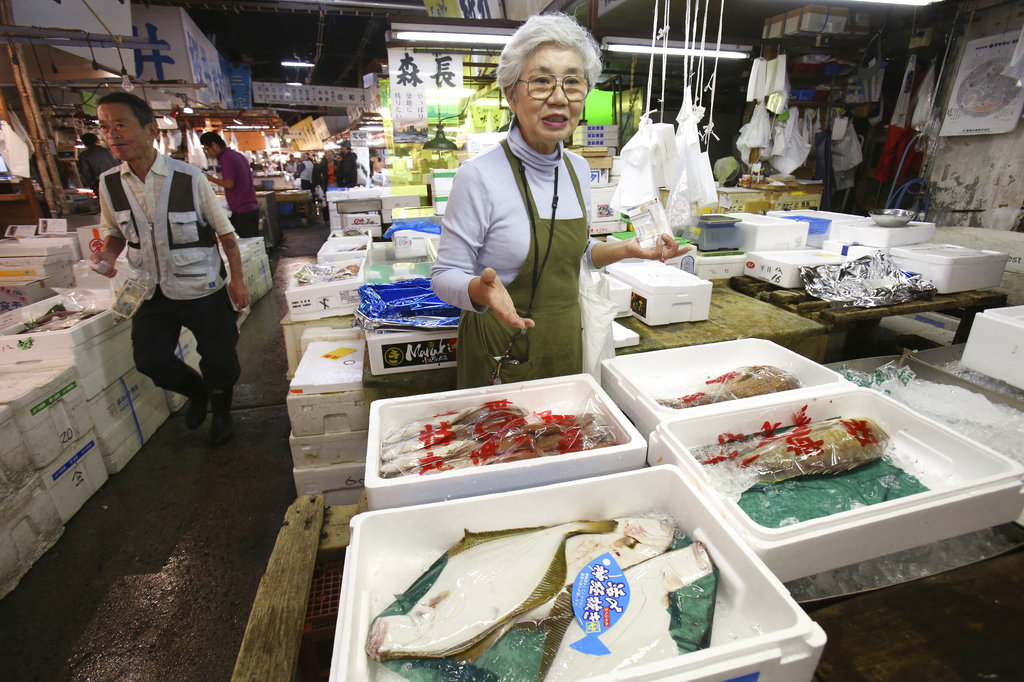
In this Sept. 26, 2018, photo, Tai Yamaguchi of fish wholesaler Hitoku Shoten, speaks during an interview with the Associated Press at Tsukiji fish market in Tokyo. Japan’s famed Tsukiji fish market is closing down on Saturday, Oct. 6, 2018 after eight decades, with shop owners and workers still doubting the safety of its replacement site. “If the new place were better, I’ll be happy to move,” said Yamaguchi. Yamaguchi feels it has been mishandled by authorities who failed to fully consult those affected. (AP Photo/Koji Sasahara)
TOKYO — After years of delays Tokyo’s 80-year-old Tsukiji fish market is closing on Saturday to move to a more modern facility on reclaimed industrial land in Tokyo Bay.
The new, 569 billion yen ($5 billion) facility at Toyosu will open on Oct. 11, over the objections of many working in Tsukiji who contend the new site is contaminated, inconvenient and unsafe.
“If the new place were better, I’ll be happy to move,” said Tai Yamaguchi, whose family has run fish wholesaler Hitoku Shoten since 1964.
The 75-year-old leader of a group of 30 women whose families run shops in Tsukiji opposed to the move, Yamaguchi feels it has been mishandled by authorities who failed to fully consult those affected.
“They are hiding so much,” she said.
Tsukiji now has more than 500 wholesalers employing several thousand people. About 40,000 people visit each day. Much of the angst over the move has to do with closing down a beloved local institution.
A labyrinth of quaint sushi stalls and shops selling knives and ice cream encircling the huge wholesale market famous for its predawn haggling over deep-frozen tuna and other harvests from the sea, Tsukiji has been supplying Tokyo’s fancy restaurants and everyday supermarkets since 1935. Its origins date back nearly a century.
FILE – In this Jan. 5, 2018, file photo, wholesalers perform a ritual hand-clapping for the first auction of fresh tuna fish of the year at the Tsukiji Market in Tokyo. Japan’s famed Tsukiji fish market is closing down on Saturday, Oct. 6, 2018 after eight decades, with shop owners and workers still doubting the safety of its replacement site. (AP Photo/Eugene Hoshiko, File)
Opponents of the move fear tourists will be less likely to visit out-of-the-way Toyosu, which resembles a huge, modern factory and lacks the picturesque quality of Tsukiji.
Makoto Nakazawa, 54, who has worked in Tsukiji for more than 30 years, said he dislikes the new space he will be working in and is angry over the closure of a market that has “fed Tokyo for years.”
Tsukiji is special, a place of unusual diversity in conformist Japan where misfits like avant-garde theater actors and convicts are accepted, Nakazawa said.
“People who want us out want to redevelop this place. I can’t imagine any other reason,” he said. “There’s obviously money to be made.”
Some of Tsukiji’s sprawling shops will remain in their old locale surrounding the market site. But the wholesale market itself, which clears an average of 1.6 billion yen, or about $14.5 million, worth of seafood a day, is leaving for good after a decade of controversy.
In the latest setback, Gov. Yuriko Koike postponed the move, which had been scheduled for November 2016, after an inspection found arsenic and other contaminants in the groundwater at Toyosu, a former gas plant.
This photo shows Tsukiji fish market in Tokyo Thursday, Oct. 4, 2018. Japan’s famed Tsukiji fish market is closing down on Saturday, Oct. 6 after eight decades, with shop owners and workers still doubting the safety of its replacement site. (AP Photo/Yuri Kageyama)
“Safety has been ensured,” Koike declared at a recent opening ceremony for the new market after extra concrete was poured and better water pumps installed. Even now, cracks stretching for several meters have appeared in the paving in Toyosu’s loading area. City officials say they’re not dangerous and will be fixed.
Koike stressed Toyosu will carry on the “Tsukiji brand.”
The long-term future for the Tsukiji site is still undecided.
Spanning more than 230,000 square meters, or the equivalent of about 17 baseball fields, it first will be turned into a parking lot for the 2020 Tokyo Olympics.
Ideas for the long-term include an amusement park, a casino, a shopping mall — all of them and more. Its location smack in downtown Tokyo within walking distance from the glitzy Ginza shopping district makes for lucrative opportunities.
An informal opinion survey by Yamaguchi’s group found that 80 percent of 261 Tsukiji businesses that responded were unhappy about the move. The survey’s response rate was about 50 percent.
Several hundred market workers joined by labor union members, housewives and others marched on a rainy Saturday afternoon from Tsukiji through Tokyo’s downtown in a final protest.
“What’s wrong with Tsukiji? What’s wrong with Tsukiji? Tsukiji for another hundred years!” they shouted, banging on drums and waving placards.
City hall insisted a more modern and efficient facility was needed. Workers say Tsukiji’s layout, with its myriad of zipping carts, is a work of art that evolved over the years.
As the shutdown neared, Gianluca Lonati, 31, a chef, and Kayleigh Gill, 25, a bar manager, visiting together from Sydney, were among many tourists and locals visiting the market one recent afternoon.
They said they were planning to have some fresh Tsukiji fish with their feast of ramen, green tea ice cream and savory “okonomiyaki” pancakes.
“It’s very sad,” Gill said of the plans to close the market. “You really get to see inside old Japanese culture.” /muf